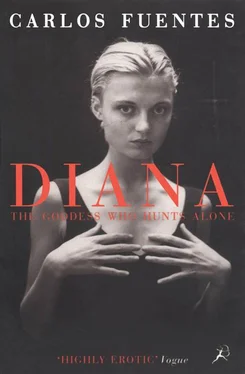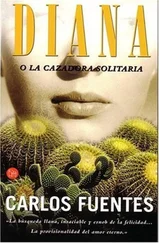Carlos Fuentes - Diana the Goddess Who Hunts Alone
Здесь есть возможность читать онлайн «Carlos Fuentes - Diana the Goddess Who Hunts Alone» весь текст электронной книги совершенно бесплатно (целиком полную версию без сокращений). В некоторых случаях можно слушать аудио, скачать через торрент в формате fb2 и присутствует краткое содержание. Год выпуска: 2012, Издательство: Bloomsbury UK, Жанр: Современная проза, на английском языке. Описание произведения, (предисловие) а так же отзывы посетителей доступны на портале библиотеки ЛибКат.
- Название:Diana the Goddess Who Hunts Alone
- Автор:
- Издательство:Bloomsbury UK
- Жанр:
- Год:2012
- ISBN:нет данных
- Рейтинг книги:3 / 5. Голосов: 1
-
Избранное:Добавить в избранное
- Отзывы:
-
Ваша оценка:
- 60
- 1
- 2
- 3
- 4
- 5
Diana the Goddess Who Hunts Alone: краткое содержание, описание и аннотация
Предлагаем к чтению аннотацию, описание, краткое содержание или предисловие (зависит от того, что написал сам автор книги «Diana the Goddess Who Hunts Alone»). Если вы не нашли необходимую информацию о книге — напишите в комментариях, мы постараемся отыскать её.
Diana the Goddess Who Hunts Alone — читать онлайн бесплатно полную книгу (весь текст) целиком
Ниже представлен текст книги, разбитый по страницам. Система сохранения места последней прочитанной страницы, позволяет с удобством читать онлайн бесплатно книгу «Diana the Goddess Who Hunts Alone», без необходимости каждый раз заново искать на чём Вы остановились. Поставьте закладку, и сможете в любой момент перейти на страницу, на которой закончили чтение.
Интервал:
Закладка:
Carlos Fuentes
Diana the Goddess Who Hunts Alone
I
No bondage is worse than the hope of happiness. God promises us a vale of tears on this earth, but at least that suffering comes eventually to an end. Eternal life is eternal bliss. Rebellious, unsatisfied, we argue with God: Don’t we deserve even a taste of eternity during our passage through time? God has more tricks than a Las Vegas cardsharp. He promises us joy in the hereafter and sorrow on earth. We convince ourselves that knowing life and living it well in His vale of tears is the supreme defiance of God. Of course, if we are triumphant in our rebellion, God gets even: He denies us immortality at His side and condemns us to eternal pain.
Contrary to all logic, we ascribe logic to the Divinity. We tell ourselves, God could not be the creator of misery and suffering, human cruelty and human barbarity. We say, in any case, it was not a good God who created that but a bad God, the God of appearances, the masked God whom we can overcome only by wielding the weapons of evil that He himself forged. Sex, crime, and, above all, the imagination of evil: aren’t these also the gifts of a malevolent God? So we persuade ourselves that only if we murder the usurper God will we, clean in body, mentally free, see the face of the first God, the good God.
But the great cardsharp has yet another ace up his sleeve. When we’ve worn out body and soul trying to reach Him, God reveals that He is only what He is not. All we can know about God is what He is not. To know what God is is something neither saints, nor mystics, nor Church Fathers know; not even God Himself knows. He’d collapse, fulminated by His own intelligence, if He knew.
Bedazzled, Saint John of the Cross is the mortal who has come closest to God’s intelligence, just so he can communicate this news to us: “God is Nothing, the supreme Nothing, and to reach Him, we must travel toward the Nothing, which cannot be touched or seen or understood in human terms.” And to humiliate hope, Saint John leaves us only this terrible passage: “All the being the creatures possess, compared with the infinite being of God, is nothing … All the beauty of the creatures, compared with God’s infinite beauty, is the greatest ugliness.” Perhaps Pascal, French, a saint, and a cynic, is the only thinker whose wager saves both our conscience and our concupiscence: if you wager that God exists and He doesn’t, you lose nothing, but if God does exist, you win everything.
Standing between Saint John and Pascal, I give God a nominal, that is substantive, value: God is the shorthand term for what brings origins and destiny together in a single embrace. The reconciliation of these two terms has been humanity’s immemorial task. To choose origins alone is at first a lyrical, then very quickly a totalitarian nostalgia. To wed oneself exclusively to destiny can be a form of fatalism or fortune-telling. Origins and destiny should be inseparable: memory and desire, the living passage in the present, the future, here and now … That’s where I’d like to locate Diana Soren, a woman perversely touched by the Divine.
Standing between Pascal and Saint John of the Cross, I would like to create a mythic, verbal world for her that would approach the mendicant question that stretches out its hands between earth and heaven: Can we love on earth and someday deserve heaven? Instead of being penitents, flagellants, hermits, or creatures starved for life, can we fully participate in it? Can we obtain and deserve earthly fruits without sacrificing eternal life? Without begging forgiveness for having loved “not wisely but too well”?
Christian mythology, which opposes charity to the implacable judgment of the Old Testament, does not attain the beautiful ambiguity of pagan mythology. The protagonists of Christianity are always themselves, never others. They demand an act of faith, and faith, Tertullian said, is absurd: “It is true because it is incredible.” But what is absurd is not necessarily ambiguous. Mary is a virgin, though she conceives. Christ rises, though He dies. But who is Prometheus, he who steals the sacred fire? Why does he exercise his freedom so as to lose it? Would he have been freer if he hadn’t used it and lost it though he didn’t win it either? Can freedom be conquered by a value other than freedom itself? On this earth, can we love only if we sacrifice love, if we lose the person we love though our own acts, our own failure to act?
Is something preferable to everything or nothing? That’s what I asked myself when the love affair I’m going to tell about here ended. She gave me everything and took everything from me. I asked her to give me something better than everything or nothing. I asked her to give me something. That something can only be the instant in which we were, or thought we were, happy. How many times did I ask myself, Will I always be what I am now? I remember, and I write to recover the moment when she would forever be as she was that night with me. But all unique things, amatory, literary, in memory or desire, are quickly abolished by the great tide that always rolls over us like a dry flame, like a burning flood. All we have to do is leave our own skin for an instant to know that we are surrounded by an all-powerful pulsation that precedes and survives us. For that pulsation, my life or hers, our very existences are unimportant.
I love and I write to obtain an ephemeral victory over the immense and infinitely powerful mystery of what is there but does not show itself … I know the triumph is fleeting. On the other hand, it makes invincible my own secret power, which is to do something — this very moment — unlike anything in the rest of our lives. Imagination and language show me that, for imagination to speak and for language to imagine, the novel must not be read as it was written. This condition becomes extremely dangerous in an autobiographical text. The writer must be lavish in presenting variations on his chosen theme, multiply the reader’s options, and fool style with style through constant alterations in genre and distance.
This becomes an even greater need when the protagonist is a movie actress, Diana Soren.
It’s said that Luchino Visconti provoked a combination of surprise and delight in Burt Lancaster during the filming of a scene from The Leopard when he stuffed with silk stockings a bag supposedly filled with gold. Diana was like that: a surprise for everyone because of the incomparable smoothness of her skin, but most of all a surprise for herself, her skin surprised by her own pleasure, astonished at being desired, smooth, perfumed. Didn’t she love herself, didn’t she feel she deserved herself? Why did she want to be someone else? Why wasn’t she comfortable in her own skin? Why?
I — and I lived with her only for two months — want to run even now to embrace her again, feel her for the last time and assure her that she could be loved with passion, but for herself, that the passion she sought did not exclude her true self… But the chance for that is gone. We leave a lover. We return to a woman we don’t know. The eroticism of visual representation consists, precisely, in the illusion that the flesh is permanent. Like everything else in our time, visual eroticism has accelerated. Over the course of centuries, medallions and paintings were created to make up for the absence of the loved one. Photography accelerated the illusion of presence. But only cinematographic images simultaneously give us evocation and immediacy. This is how she was then but also how she is now, forever…
It’s her image but also her voice, her movement, her undying beauty and youth. Death, the great stepmother of Eros, is both overcome and justified by this reunion with the loved one who is no longer with us, having broken the grand pact of passion: united until death, you and I, inseparable …
Читать дальшеИнтервал:
Закладка:
Похожие книги на «Diana the Goddess Who Hunts Alone»
Представляем Вашему вниманию похожие книги на «Diana the Goddess Who Hunts Alone» списком для выбора. Мы отобрали схожую по названию и смыслу литературу в надежде предоставить читателям больше вариантов отыскать новые, интересные, ещё непрочитанные произведения.
Обсуждение, отзывы о книге «Diana the Goddess Who Hunts Alone» и просто собственные мнения читателей. Оставьте ваши комментарии, напишите, что Вы думаете о произведении, его смысле или главных героях. Укажите что конкретно понравилось, а что нет, и почему Вы так считаете.












